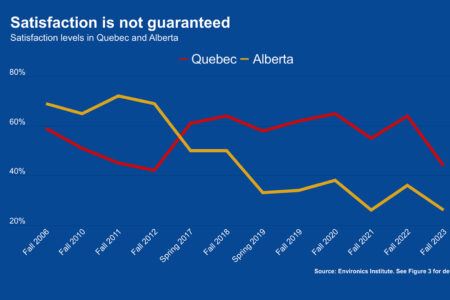
He may have been out of politics in Alberta for more than two decades, but when Peter Lougheed speaks, he still commands enormous attention. And recently, he’s been speaking out on a problem that has policy-makers and industry leaders in the province scratching their heads.
“I just find it completely unacceptable that our resource involves shipping jobs down the pipeline with bitumen to the United States,” Lougheed said at an oil sands conference last winter.
He’s not alone in his concern. There is a growing worry in Alberta that wealth is being lost if raw bitumen from the oil sands is being piped to the US for upgrading and refining. It is the “value-added” step of taking a commodity and turning it into something useful ” crude oil and refined products like gasoline and jet fuel — that Alberta stands to lose.
Some of the furrowed brows may be overreacting a bit. At the moment, by far the majority of Alberta’s bitumen and conventional crude oil is upgraded and refined in the province. And big companies like Canadian Natural Resources and Petro-Canada have plans to increase their upgrading and refining in Alberta. If all new upgraders and expansions go ahead, about 80 percent of Alberta’s future oil sands production will be upgraded in the province.
But troublesome cracks are starting to show, too. Other companies — EnCana, Husky, Shell — are talking about shipping the thick, oozy bitumen south of the border for upgrading. If that develops into a larger trend, it would solidify Canada’s embarrassing label as a hewer of wood and drawer of water.
The frightful prospect of increased exports of raw bitumen was even an issue during last fall’s Progressive Conservative leadership contest. One of the early front-runners, Jim Dinning, has deep ties with Calgary’s energy elite. During the campaign he said: “I believe that if you mine it here, you upgrade it here,” although he quickly added that he would not interfere with projects that have already been approved.
Among politicians and Albertans alike, there is unanimous support for increased upgrading and refining in Alberta.
But the question that no one seems to be able to answer is…how? Without market interference or throwing tax dollars toward a provincially owned upgrading facility, how do you encourage more value-added upgrading and refining in the province?
So far, very few practical solutions have been put forward. Appealing to the energy giants’ desire to be good corporate citizens only goes so far. After all, they are businesses and must answer to shareholders. Spending billions to upgrade bitumen in Alberta cannot be justified only because it’s a nice thing to do. There has to be a solid business case.
For its part, the provincial government has given no indication that it is interested in market interference (e.g., regulatory sticks or tax carrots) as a means by which to foster greater value-added. The government is unabashedly pro-market. And while the new premier, Ed Stelmach, has commissioned a panel to review oil and gas royalties in the province, the upgrading and refining of the raw product is unlikely to factor into the panel’s recommendations.
Part of the problem in justifying more upgraders in Alberta is cost. These are massive capital projects that take years to build. They also use up a lot of labour. Shell Canada’s Scotford refinery, just east of Edmonton, was completed a few years ago. During the peak of construction, over 9,000 construction workers were on-site at the same time. That is the equivalent of a small city.
In case anyone has not yet heard, labour shortages are reaching critical levels in Alberta. Even if the province were to announce plans for a publicly owned upgrader, there would be no one around to build it. One of the main arguments of those in favour of more stay-at-home upgrading is that it would create thousands of jobs for Albertans. But it is the shortage of workers — not the shortage of jobs — that is the big problem at the moment.
If the provincial government sticks with its pro-market policy preferences — and all indications are that it will — Albertans may have to put up with more raw product being shipped to the US for upgrading and refining. As always with the market, you take the good and you take the bad.
The option is to artificially prop up an activity that is neither feasible (i.e., too expensive) nor practical (i.e., no labour to build it). Alberta learned the painful lessons of using tax dollars to force economic diversification back in the 1980s. No one wants to go down that road again.
In the end, Albertans should not fret over an increase in the amount of raw material that is being exported. Sure, it does represent lost potential for wealth creation at home, but it need not be so forever. At another point in time, the economic balances will shift once again. Construction costs will be tempered, labour will be more plentiful, and more upgrading in Alberta will once again be economically feasible.
Do you have something to say about the article you just read? Be part of the Policy Options discussion, and send in your own submission. Here is a link on how to do it. | Souhaitez-vous réagir à cet article ? Joignez-vous aux débats d’Options politiques et soumettez-nous votre texte en suivant ces directives.









